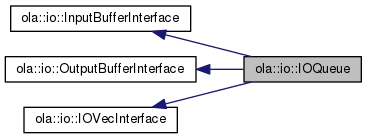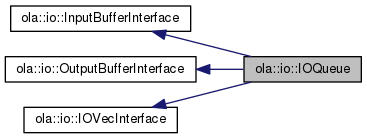|
|
static void | FreeIOVec (const struct IOVec *iov) |
| |
◆ ~IOQueue()
| ola::io::IOQueue::~IOQueue |
( |
| ) |
|
◆ AppendBlock()
| void ola::io::IOQueue::AppendBlock |
( |
class MemoryBlock * |
block | ) |
|
Append an MemoryBlock to this queue. This may leave a hole in the last block before this method was called, but that's unavoidable without copying (which we don't want to do).
◆ AppendMove()
| void ola::io::IOQueue::AppendMove |
( |
IOQueue * |
other | ) |
|
Move the contents of one IOQueue to another.
- Parameters
-
◆ AsIOVec()
| const struct IOVec * ola::io::IOQueue::AsIOVec |
( |
int * |
iocnt | ) |
const |
|
virtual |
Return this IOQueue as an array of IOVec structures. Note: The IOVec array points at internal memory structures. This array is invalidated when any non-const methods are called (Append, Pop etc.)
Is the IOQueue is empty, this will return NULL and set iocnt to 0.
Use FreeIOVec() to release the IOVec array.
Implements ola::io::IOVecInterface.
◆ Clear()
| void ola::io::IOQueue::Clear |
( |
| ) |
|
◆ Dump()
| void ola::io::IOQueue::Dump |
( |
std::ostream * |
output | ) |
|
Dump this IOQueue as a human readable string
◆ Peek()
| unsigned int ola::io::IOQueue::Peek |
( |
uint8_t * |
data, |
|
|
unsigned int |
n |
|
) |
| const |
Copy the first n bytes into the region pointed to by data
◆ Pop()
| void ola::io::IOQueue::Pop |
( |
unsigned int |
n | ) |
|
|
virtual |
◆ Read() [1/2]
| unsigned int ola::io::IOQueue::Read |
( |
uint8_t * |
data, |
|
|
unsigned int |
n |
|
) |
| |
|
virtual |
◆ Read() [2/2]
| unsigned int ola::io::IOQueue::Read |
( |
std::string * |
output, |
|
|
unsigned int |
n |
|
) |
| |
|
virtual |
◆ Size()
| unsigned int ola::io::IOQueue::Size |
( |
| ) |
const |
|
virtual |
◆ Write()
| void ola::io::IOQueue::Write |
( |
const uint8_t * |
data, |
|
|
unsigned int |
length |
|
) |
| |
|
virtual |
The documentation for this class was generated from the following files:
- include/ola/io/IOQueue.h
- common/io/IOQueue.cpp




 Static Public Member Functions inherited from ola::io::IOVecInterface
Static Public Member Functions inherited from ola::io::IOVecInterface 1.8.13
1.8.13